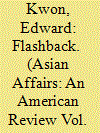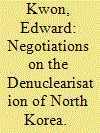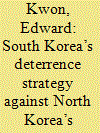|
|
|
Sort Order |
|
|
|
Items / Page
|
|
|
|
|
|
|
| Srl | Item |
| 1 |
ID:
167946


|
|
|
|
|
| Summary/Abstract |
This paper analyzes the background of the nuclear stalemate between Trump and
Kim in the Hanoi Summit and investigates various issues involving North Korean
denuclearization, including a detailed roadmap and proper compensation for
Pyongyang. The paper uses tree cardinal perspectives of analytical tools (the will of
the leader, nuclear capability, and nuclear strategy) to critically assess North Korea’s
nuclear weapons program and fathom Kim Jong Un’s stance on denuclearization.
The United States reaffirms CVID/FFVD principles regarding North Korea’s
WMD, while Pyongyang prefers an action-for-action method of denuclearization.
Although Pyongyang has announced an end to its nuclear testing and has shut down
nuclear facilities, experts question whether Pyongyang really is dismantling its
nuclear program. Pyongyang’s hidden nuclear facilities and accumulation of HEU
in numerous places, the complicated process of verification, as well as potential
traps in the details of the denuclearization agreement pose a big challenge. In light
of the current nuclear stalemate, President Moon’s mediating effort to bring Kim
Jong Un back to the denuclearization table is imperative.
|
|
|
|
|
|
|
|
|
|
|
|
|
|
|
|
| 2 |
ID:
113044


|
|
|
|
|
| Publication |
2012.
|
| Summary/Abstract |
This paper investigates financial liberalization in Mexico and South Korea from a comparative international political economy perspective. Though the two countries have a different political economy background, their experiences with financial repression and liberalization were similar, as was the manner in which they handled the subsequent huge inflow of capital. During the process of financial liberalization, both governments had their policy autonomy undermined by strong domestic interest groups as well as by influential international actors. Similar situational effects also prevailed during these two countries' financial crises: both experienced surges of international financial capital, had presidential elections during the crisis, and joined the OECD around that time. This paper sheds light on how the two countries experienced macroeconomic imbalances and financial crisis as a result of financial liberalization. The experience suggests meaningful lessons for other developing countries regarding the policy dilemmas that can arise from financial liberalization.
|
|
|
|
|
|
|
|
|
|
|
|
|
|
|
|
| 3 |
ID:
109758


|
|
|
| 4 |
ID:
187226


|
|
|
|
|
| Summary/Abstract |
This article analyzes a series of summit diplomacy efforts by the former United States President Donald Trump, and South Korea's President Moon Jae-in, to persuade North Korean leader Kim Jong Un to give up the country's nuclear weapons program. Through critical evaluation of the summits between Trump and Kim as well as Moon and Kim, the paper provides several important lessons on how to deal with North Korea. Kim Jong Un's mindset and strategic calculation of a denuclearization deal with Trump, amid the recent progress of North Korea's nuclear weapons and ICBMs programs, are investigated. Given the failure to reach a denuclearization agreement at the Hanoi Summit, Pyongyang is not expected readily to give up its nuclear weapons. North Korea had temporarily refrained from severe military provocations, such as test-firing ICBMs or conducting another round of nuclear weapon experiments by self-moratorium since April 2018. However, Pyongyang reversed direction with this policy in 2022 and resumed coercive diplomacy in order to achieve its desired goals. As North Korea's incessant efforts to advance its nuclear weapons and ICBMs programs brings with a dismal outlook for peace building both on the Korean Peninsula and the world, this paper investigates a series of policy lessons to manage the North Korean nuclear crisis.
|
|
|
|
|
|
|
|
|
|
|
|
|
|
|
|
| 5 |
ID:
160673


|
|
|
|
|
| Summary/Abstract |
This paper analyzes the policy remedies for dealing with North Korea's nuclear weapons and missile programs. After six nuclear tests and three recent successful ICBM tests, North Korea is close to miniaturizing nuclear warheads and establishing a reliable delivery system, thus achieving a much-feared nuclear weapons capability. In defiance of the extraordinarily tough U.N. Security Council resolutions, Pyongyang persists in developing nuclear weapons. North Korea's nuclear weapons program already has exceeded the strategic patience, of the U.S.-ROK alliance. Harsher policy options to deal with the DPRK nuclear weapons are imperative. Several drastic options, including severe sanctions, preventive bombing, nuclear armament of South Korea, are evaluated in the final round of engagement policy on guaranteeing nonaggression and a peace agreement with Pyongyang.
|
|
|
|
|
|
|
|
|
|
|
|
|
|
|
|
| 6 |
ID:
158630


|
|
|
|
|
| Summary/Abstract |
This paper examines how South Korea might be able to deter the growing threat from North Korea’s nuclear weapons and missile programs. North Korea’s six nuclear weapons experiments with various types of missile test fires using solid fuel and new technology pose a security threat to South Korea and the USA. The credibility of the North’s WMD capability and the military balance of two Koreas are critically analyzed. South Korea’s superior conventional weapons system, supported by U.S. strategic weapons and intelligence systems, could fend off North Korean nuclear weapons and missile attacks. However, it is imperative that the U.S.-ROK alliance continues to develop a stringent nuclear deterrence strategy and deploy a series of countermeasures, including preemptive strikes and a multilayered missile defense system, such as Kill Chain, KAMD, and THAAD, all to guard against a potential nuclear weapon attack from North Korea.
|
|
|
|
|
|
|
|
|
|
|
|
|
|
|
|
| 7 |
ID:
136582


|
|
|
|
|
| Summary/Abstract |
This paper examines the feasible policy options of the United States and Republic of Korea alliance in coping with the current DPRK nuclear crisis. North Korea’s third nuclear weapon experiment with several medium- and long-range missile test firings pose a security threat to South Korea. In March 2013, the Central Committee of the Workers’ Party adopted a new strategy of simultaneously building up the economy and nuclear capability. As a non-nuclear power, South Korea faces difficulty in developing effective countermeasures against the nuclear threat from the North. Although the United States has confirmed its commitment to defending South Korea, Seoul cannot dispel its own anxiety of a potential peril of nuclear attack from the North. This paper investigates what feasible policy options are available to the U.S.-ROK alliance in the face of the DPRK’s nuclear threat.
|
|
|
|
|
|
|
|
|
|
|
|
|
|
|
|
|
|
|
|
|